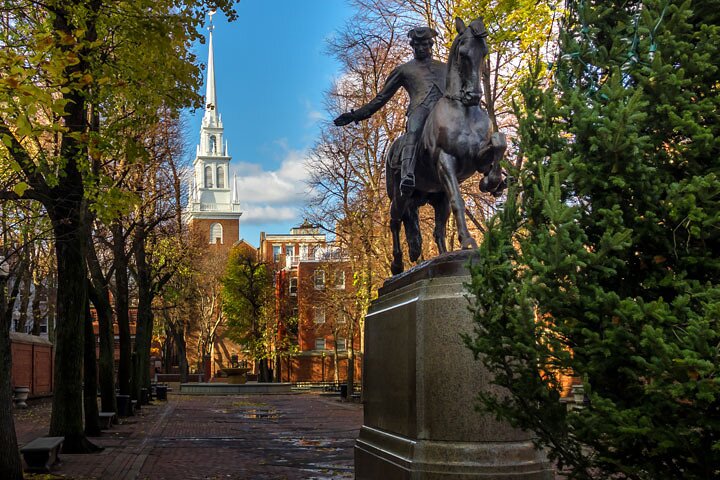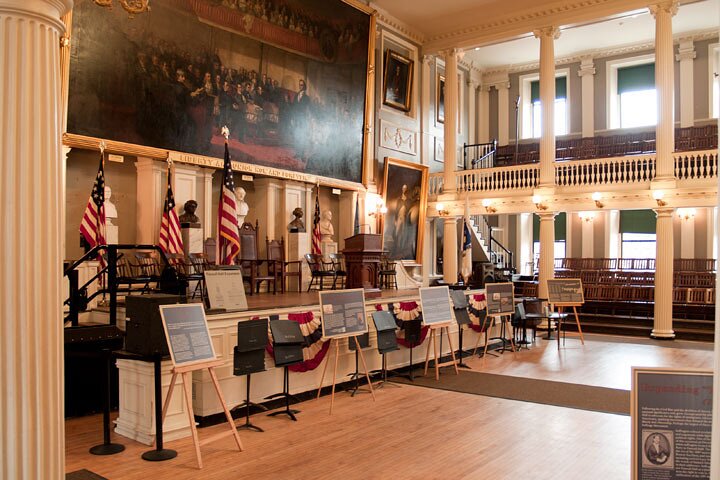Exploring Boston’s Revolutionary Roots: A Historian’s Perspective on the Freedom Trail
As a historian with a passion for uncovering the past, I was drawn to Boston’s Freedom Trail to explore the roots of the American Revolution. Guided by the exceptional Mark Krumm, this tour offered a captivating journey through history, revealing both well-known landmarks and hidden gems.
A Journey Through Time: The Freedom Trail Experience
Boston, a city steeped in history, offers a unique opportunity to walk through the very streets where the seeds of revolution were sown. As a former professor of European history, I have always been fascinated by the intricate tapestry of events that shape nations. The Freedom Trail Tour was an experience that allowed me to delve into the American Revolution’s rich history, guided by the exceptional Mark Krumm.
Our journey began at the Massachusetts State House, a masterpiece of Federal Architecture designed by Charles Bulfinch. The golden dome gleamed in the morning sun, a beacon of the state’s storied past. Mark, our guide, immediately set the tone with his engaging storytelling, weaving together facts and anecdotes that brought the past to life. His passion for history was infectious, and his ability to connect with each member of our small group, including my wife and me, was remarkable.
As we moved through the city, Mark’s knowledge of the sites was unparalleled. From the Park Street Church, known for its fiery sermons and ties to the Abolition Movement, to the Granary Burying Ground, where revolutionaries like Samuel Adams and Paul Revere rest, each stop was a chapter in the unfolding story of America’s fight for independence. Mark’s insights into these historical figures and events were both enlightening and entertaining, making the experience both educational and enjoyable.
Hidden Gems and Historical Insights
One of the highlights of the tour was Mark’s willingness to take us off the beaten path. While the official Freedom Trail is a well-trodden route, Mark’s detours revealed hidden gems that added depth to our understanding of Boston’s history. His decision to include sites not typically on the trail, such as the Ebenezer Hancock House and the Old South Meeting House, provided a more comprehensive view of the revolutionary era.
The Old State House, with its connection to the Boston Massacre, was a poignant reminder of the tensions that led to war. Mark’s vivid description of the events that unfolded there made it easy to imagine the charged atmosphere of the time. His ability to paint a picture with words was a testament to his expertise and passion for the subject.
Mark’s approach was refreshingly personal. Unlike many tours that rely on costumes or loudspeakers, his style was conversational and engaging. He encouraged questions and was always ready with a thoughtful response. His attention to detail extended beyond the historical narrative, as he ensured our comfort with water and restroom breaks, and even offered photography tips to capture the essence of our journey.
A Memorable Conclusion
The tour concluded at the USS Constitution, the world’s oldest commissioned warship. Standing on the deck of “Old Ironsides,” I couldn’t help but reflect on the resilience and determination of those who fought for freedom. Mark’s final words resonated with me, as he tied together the themes of the tour and left us with a deeper appreciation for the sacrifices made by those who came before us.
As someone who has explored countless historical sites across Europe, I found the Freedom Trail to be a unique and enriching experience. Mark Krumm’s expertise and enthusiasm made it a standout tour, one that I would highly recommend to anyone visiting Boston. His ability to connect the past with the present, and to make history accessible and engaging, is a rare gift.
For those seeking a comprehensive and insightful exploration of Boston’s revolutionary history, the Freedom Trail Tour is an opportunity not to be missed. It is a journey through time that will leave you with a newfound appreciation for the city’s pivotal role in shaping the nation.





















































